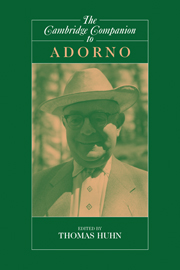Book contents
- Frontmatter
- Introduction: Thoughts beside Themselves
- 1 Negative Dialectic as Fate
- 2 Weighty Objects
- 3 Adorno, Marx, Materialism
- 4 Leaving Home
- 5 Is Experience Still in Crisis? Reflections on a Frankfurt School Lament
- 6 Mephistopheles in Hollywood
- 7 Right Listening and a New Type of Human Being
- 8 Authenticity and Failure in Adorno’s Aesthetics of Music
- 9 Dissonant Works and the Listening Public
- 10 Adorno, Heidegger, and the Meaning of Music
- 11 The Critical Theory of Society as Reflexive Sociology
- 12 Genealogy and Critique
- 13 Adorno’s Negative Moral Philosophy
- 14 Adorno’s Social Lyric, and Literary Criticism Today
- 15 Adorno’s Tom Sawyer Opera Singspiel
- Select Bibliography
- Index
Introduction: Thoughts beside Themselves
Published online by Cambridge University Press: 28 May 2006
- Frontmatter
- Introduction: Thoughts beside Themselves
- 1 Negative Dialectic as Fate
- 2 Weighty Objects
- 3 Adorno, Marx, Materialism
- 4 Leaving Home
- 5 Is Experience Still in Crisis? Reflections on a Frankfurt School Lament
- 6 Mephistopheles in Hollywood
- 7 Right Listening and a New Type of Human Being
- 8 Authenticity and Failure in Adorno’s Aesthetics of Music
- 9 Dissonant Works and the Listening Public
- 10 Adorno, Heidegger, and the Meaning of Music
- 11 The Critical Theory of Society as Reflexive Sociology
- 12 Genealogy and Critique
- 13 Adorno’s Negative Moral Philosophy
- 14 Adorno’s Social Lyric, and Literary Criticism Today
- 15 Adorno’s Tom Sawyer Opera Singspiel
- Select Bibliography
- Index
Summary
Theodor Wiesengrund Adorno was a philosopher, composer, essayist, and social theorist. He was born in 1903 in Frankfurt, Germany, where his father, Oskar Wiesengrund, was a prominent wine merchant and assimilated Jew who had converted to Protestantism. His mother, Maria Cavelli-Adorno della Piana, was a Catholic and had enjoyed a successful career as a singer until the time of her marriage to Adorno's father. (In 1938 Adorno had his name changed from Wiesengrund to Adorno.) Adorno was an only child in a quite well off household that he described as presided over by two mothers. His other “mother” was his mother's sister, Agathe Calvelli-Adorno. She too had had a successful musical career, as a pianist. At the age of fifteen, Adorno began weekly study meetings with Siegfried Kracauer, a man fourteen years his senior and then editor of the liberal newspaper Frankfurter Zeitung. The weekly meetings continued for many years and had Kant’s Critique of Pure Reason as their first object of study. Adorno later reported that he owed far more of his intellectual development to these meetings than to his academic teachers. Adorno began his university studies in Frankfurt in 1921, studying philosophy, sociology, music, and psychology. It was during the time of his studies that Adorno met and befriended Max Horkheimer and Walter Benjamin; the latter would become especially influential for Adorno’s philosophical work. In 1924 Adorno completed a doctorate in philosophy. In 1925 he went to Vienna, where he stayed on and off for months at a time through 1927, with the idea of continuing his musical training and possibly pursuing a career as a composer and concert pianist. In Vienna Alban Berg taught him composition and Eduard Steurmann piano; both were members of the Schoenberg circle. Adorno also continued writing the music criticism he had begun publishing in 1921. As Richard Leppert notes in his introduction to the recent collection of Adorno’s writings on music, “Between 1921, while still a teenager, and 1931 he published dozens of opera and concert reviews, reviews of published new music, as well as essays on aesthetics, and heavily favoring new music.”
- Type
- Chapter
- Information
- The Cambridge Companion to Adorno , pp. 1 - 18Publisher: Cambridge University PressPrint publication year: 2004
- 1
- Cited by

